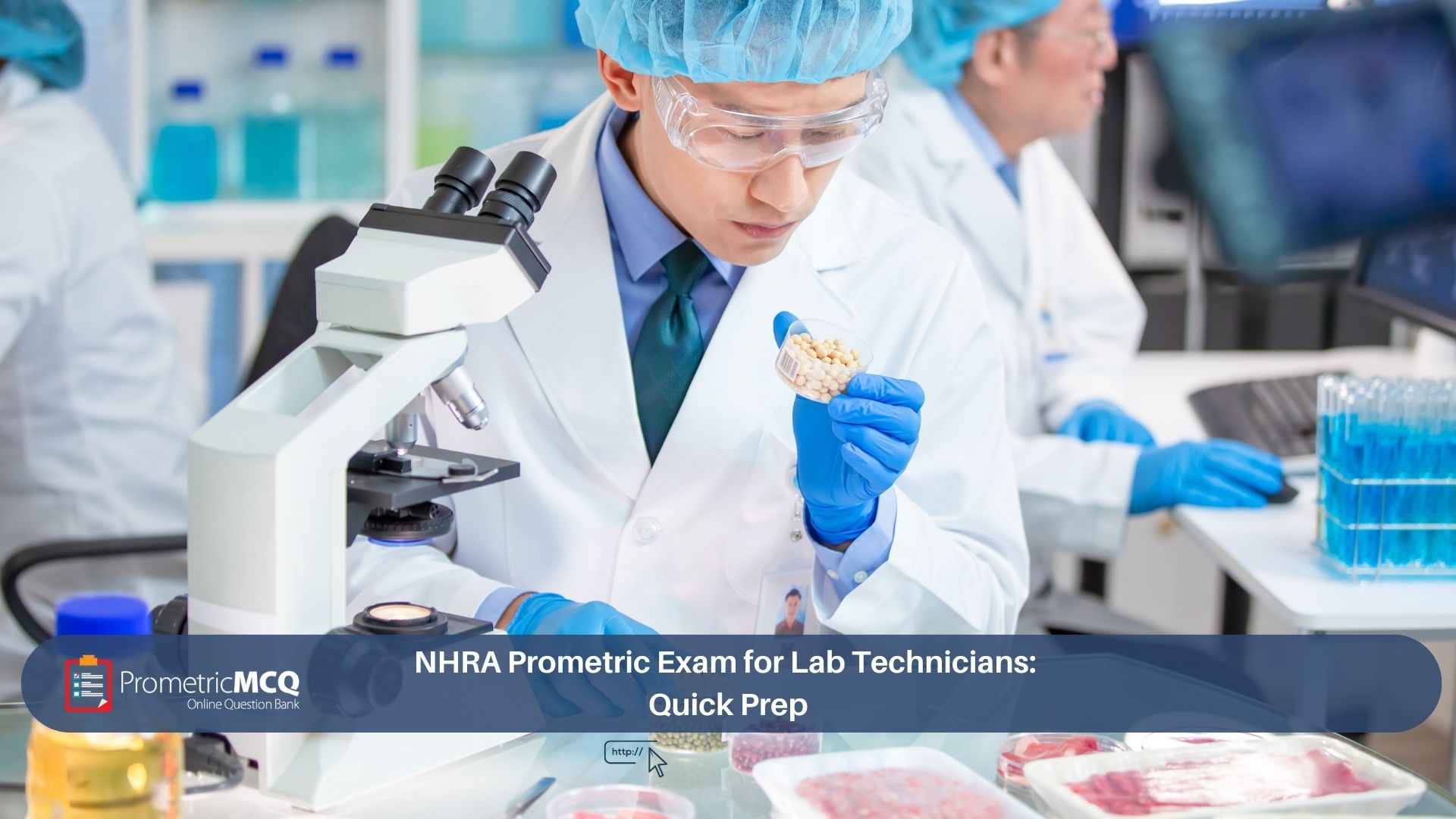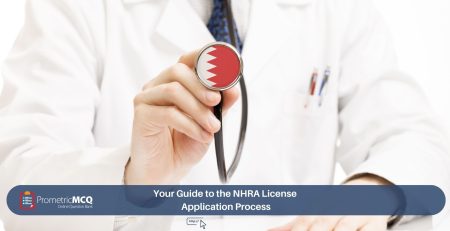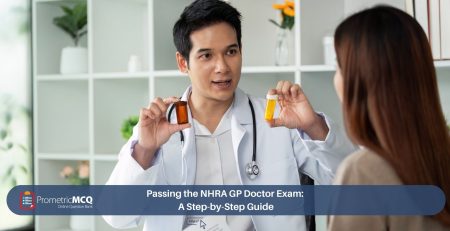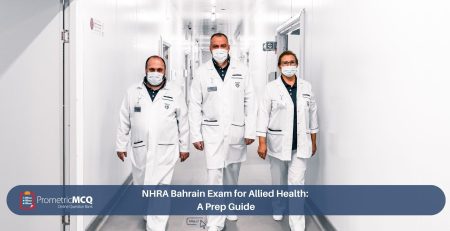
NHRA Prometric Exam for Lab Technicians: Quick Prep
fatima@prometricmcq.com2025-09-18T19:14:41+00:00Table of Contents
ToggleNHRA Prometric Exam for Lab Technicians: Quick Prep Guide
For medical laboratory technicians seeking to advance their careers in the Gulf, the Kingdom of Bahrain offers a thriving and technologically advanced healthcare environment. The key to unlocking this opportunity is passing the National Health Regulatory Authority (NHRA) Prometric Exam. This examination is a critical benchmark, ensuring that all laboratory professionals possess the necessary skills in accuracy, quality control, and theoretical knowledge to contribute to Bahrain’s high standards of patient care.
While the exam syllabus is extensive, covering every major discipline of the clinical laboratory, success is achievable even on a tight schedule with a smart and efficient preparation strategy. This guide is specifically designed for the busy professional who needs a “quick prep” plan—a focused, high-yield approach that maximizes learning and minimizes wasted time. We will move beyond simple topic lists to provide a structured study framework, an analysis of high-yield concepts, and a set of realistic sample questions with detailed rationales.
This comprehensive 2025 guide will also walk you through your most pressing questions with a detailed 10-point FAQ section. Whether you are starting your journey or looking to focus your final weeks of study, this guide provides the actionable intelligence needed for a successful Bahrain NHRA exam preparation.
Key Takeaways for a Quick Prep
- Focus on High-Yield Disciplines: Prioritize Hematology, Clinical Chemistry, and Microbiology, as these form the bulk of the exam.
- Quality over Quantity: Don’t just read; actively solve MCQs. A high-quality question bank is your most critical study asset.
- Master the “Normals”: You must have instant recall of normal reference ranges for common lab tests (CBC, electrolytes, enzymes).
- Safety and QC are Paramount: Questions on laboratory safety, quality control, and quality assurance are guaranteed to appear and are often straightforward marks.
- Identify the Classic Picture: Learn to recognize the “textbook” laboratory findings for common diseases (e.g., iron deficiency anemia, bacterial meningitis, acute MI).
Deconstructing the NHRA Lab Technician Exam Blueprint
An efficient study plan starts with knowing the battlefield. The NHRA exam for lab technicians is designed to be a comprehensive assessment of a technician’s core competencies. The exam typically consists of 100-150 MCQs to be completed in 2-3 hours.
| Core Laboratory Discipline | High-Yield Topics for a Quick Prep |
|---|---|
| Hematology & Coagulation | CBC interpretation (RBC, WBC, Platelet indices). Morphology of red and white blood cells in various anemias and leukemias. Understanding the coagulation cascade (PT/INR, aPTT) and common bleeding disorders. ESR and its significance. |
| Clinical Chemistry | Renal function tests (BUN, Creatinine). Liver function tests (ALT, AST, Bilirubin). Cardiac markers (Troponin, CK-MB). Electrolytes and acid-base balance. Glucose metabolism (fasting glucose, HbA1c). Principles of spectrophotometry. |
| Microbiology | Basics of bacteriology (Gram staining, culture media, bacterial identification). Common pathogens and the diseases they cause. Sterilization and disinfection techniques. Basic parasitology and mycology. |
| Immunology & Serology | Principles of antigen-antibody reactions. Common serological tests (ELISA, agglutination). Tests for infectious diseases (Hepatitis B markers, HIV screening). Basics of autoimmune disease markers (ANA, RF). |
| Blood Banking (Immunohematology) | ABO/Rh blood grouping and typing, including discrepancy resolution. Crossmatching procedures (compatibility testing). Transfusion reaction workup. Coombs test (Direct and Indirect). |
| Laboratory Operations | This is a crucial and often overlooked area. Topics include laboratory safety (handling biohazards, chemical safety), quality control and quality assurance (Levey-Jennings charts, Westgard rules), phlebotomy procedures, and specimen handling/processing. |
The 30-Day Quick Prep Strategy
This intensive plan is designed to maximize your score in a limited timeframe. It prioritizes active learning and focuses on high-yield areas.
Week 1: Diagnostic Assessment & Core Chemistry/Hematology
- Day 1-2: Take a full-length diagnostic mock test. Do not worry about the score. The goal is to identify your strongest and weakest areas objectively.
- Day 3-5: Dive deep into Clinical Chemistry. Focus on LFTs, RFTs, cardiac markers, and electrolytes. Do at least 50 practice questions on these topics each day.
- Day 6-7: Focus on Hematology. Master the CBC, red cell indices, and the microscopic appearance of common anemias. Do 50+ questions on Hematology.
Week 2: Microbiology, Blood Bank, and Weak Area Review
- Day 8-10: Cover Microbiology. Focus on bacterial identification, staining, and common pathogens. This is a memory-intensive subject, so use flashcards.
- Day 11-12: Master Blood Banking. ABO/Rh typing and crossmatching are the most important topics. Practice resolving blood group discrepancies.
- Day 13-14: Revisit the weakest area you identified in your diagnostic test. Dedicate two full days to strengthening this specific discipline with targeted reading and practice questions.
Week 3: Immunology, Lab Ops & Integrated Practice
- Day 15-16: Cover Immunology & Serology. Focus on the principles of common tests like ELISA and agglutination.
- Day 17-18: Study Laboratory Operations. This is critical. Master safety protocols, phlebotomy, and especially Quality Control (Westgard rules). These are often easy marks.
- Day 19-21: Begin doing mixed-subject blocks of 50 questions under timed conditions. This will train you to switch between different topics quickly, just like in the real exam.
Week 4: Final Simulation and Review
- Day 22-28: This week is all about simulation. Take one full-length mock exam every other day (e.g., Day 22, 24, 26, 28). On the days in between, meticulously review every single question from the mock exam, especially the ones you got wrong.
- Day 29-30: Taper down. Lightly review your notes, especially formulas, normal values, and QC rules. Do not learn any new material. Get plenty of rest and ensure you are mentally prepared for exam day.
Free NHRA Lab Technician Sample Questions
Test your knowledge with these high-yield questions. For more comprehensive practice, using a dedicated bank of medical laboratory MCQs is the most effective approach.
Question 1: Hematology
A complete blood count (CBC) report for an adult female shows the following results: RBC 3.5 x 10^12/L, Hgb 9.0 g/dL, Hct 28%, MCV 70 fL, MCH 22 pg, RDW 18%. Which of the following conditions is most consistent with these findings?
- Anemia of chronic disease
- Folate deficiency anemia
- Iron deficiency anemia
- Aplastic anemia
Correct Answer: C
Rationale: The results show a microcytic (low MCV), hypochromic (low MCH) anemia. The high Red Cell Distribution Width (RDW) indicates a high degree of variation in red cell size (anisocytosis), which is a classic hallmark of iron deficiency anemia as the body produces progressively smaller and paler red cells.
Question 2: Clinical Chemistry
A quality control result for glucose is 2 standard deviations above the mean on a Levey-Jennings chart. According to Westgard rules, what is the most appropriate first action for the lab technician?
- Report all patient results as normal.
- Recalibrate the instrument immediately.
- Repeat the control analysis on the same sample.
- Reject the entire run and call for service.
Correct Answer: C
Rationale: A single control value exceeding the ±2s limit is a “warning rule” (1-2s rule). It does not automatically necessitate rejecting the run. The most appropriate first step is to repeat the control run. If the repeat value is within ±2s, the initial outlier was likely a random error, and the patient run can be accepted. If it remains out of range, then further troubleshooting (like recalibration) is needed.
Frequently Asked Questions (FAQs) for the NHRA Lab Tech Exam
The NHRA does not release an official passing percentage. The exam is graded as Pass/Fail. Based on candidate experience and comparison with other regional exams, the estimated passing score is in the range of 55-60%. A safe strategy is to aim for a consistent score of 65% or higher on practice tests.
The process begins with an initial application on the official NHRA Bahrain website. After a preliminary review, you will be directed to complete the mandatory Primary Source Verification (PSV) of your credentials with the DataFlow Group. Once your DataFlow report is positive, the NHRA will grant you eligibility to book your exam via the Prometric website.
The DataFlow process is often the longest part of the registration journey. It can take anywhere from 4 to 8 weeks, and sometimes longer if there are delays in responses from your educational institutions or previous employers. It is critical to start this process as early as possible.
Yes. The NHRA exam is administered by Prometric, which has a global network of testing centers. When you schedule your exam on the Prometric website, you can search for and select a testing center in a city or country that is convenient for you.
While all disciplines are important, a strong case can be made for Laboratory Operations, specifically Quality Control. Questions on QC, safety, and specimen handling appear frequently and test fundamental principles of laboratory practice. Mastering these topics can provide you with a solid base of guaranteed marks.
The exam is designed to be a straightforward assessment of competence. “Tricky” questions often test your attention to detail. For example, a question might provide a full set of lab results, but the key to the answer lies in a single abnormal value. The trick is to be systematic and not get overwhelmed by excess information.
For a compressed study schedule, a high-quality online question bank (QBank) is indispensable. It allows for rapid, targeted practice and immediate feedback. Use the QBank to guide your study, and refer to quick-review textbooks or online resources like the guides from the American Society for Clinical Pathology (ASCP) for areas where you need to strengthen your foundational knowledge.
You must memorize the most common ones. You should be able to instantly recognize if a sodium, potassium, creatinine, glucose, hemoglobin, or platelet count is normal, high, or low without needing to look it up. The exam will assume you have this core knowledge.
Candidates are typically allowed three attempts to pass the NHRA licensing exam. If you fail, there is usually a waiting period before you can re-register and sit for the exam again. It is essential to check the specific policies outlined in your exam result notification from the NHRA.
Passing the exam makes you eligible for a professional license in Bahrain. You must then secure a job with a licensed healthcare facility. Your employer will then assist you with the final steps of license activation and the necessary work visa and residency permits.
Conclusion: Your Fast Track to a Career in Bahrain
Passing the NHRA Prometric Exam for Lab Technicians on a tight schedule is a challenging yet achievable goal. The key to a successful “quick prep” is not to study harder, but to study smarter. By focusing your energy on high-yield disciplines, adopting an active MCQ-based learning strategy, and mastering the core principles of quality and safety, you can build the confidence and competence needed to excel. This structured approach will not only prepare you to pass the exam but will also solidify your foundation as a skilled laboratory professional ready to contribute to Bahrain’s excellent healthcare system.
Ready to Accelerate Your Preparation?
Our comprehensive MCQ packages are specifically designed to cover the high-yield topics and question styles you will face on exam day. Start your quick prep now and pass with confidence.










